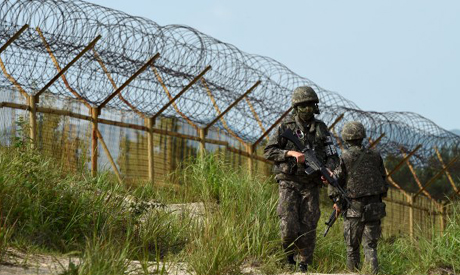
South Korean soldiers patrol along the scene of a blast inside the demilitarized zone separating the two Koreas in Paju, South Korea, in this picture taken on August 9, 2015 (Photo: Reuters)
South Korea on Monday threatened "harsh" retaliation after blaming North Korea for landmine blasts that maimed two soldiers on border patrol, ramping up military tensions on the divided peninsula.
The US-led United Nations Command which oversees the armistice that ended the 1950-53 Korean War, said analysis of the mine debris showed them to be North Korean "wooden box" landmines placed on a known South Korean border patrol path.
"The investigation determined that the devices were recently emplaced," it said, ruling out the possibility they were old mines displaced over the border by shifting soil patterns.
The three landmines were detonated by members of a military patrol last Tuesday in the South Korean half of the Demilitarized Zone (DMZ) -- a buffer area flanking both sides of the inter-Korean frontier.
One soldier underwent a double leg amputation, while another had one leg removed.
"We are certain they were North Korean landmines planted with an intention to kill by our enemies who sneaked across the military border," Defence Ministry spokesman Kim Min-Seok told reporters.
The South's Joint Chiefs of Staff vowed that North Korea would "pay a harsh price proportionate for the provocation it made".
Describing the attack as a "baseless act" and "wanton violation" of non-aggression accords, it urged the North to apologise and punish those responsible.
The defence ministry declined to comment on what was meant by "harsh price" or speculate on the retaliatory options being considered.
Analysts said the type of incident made a proportionate response difficult to gauge.
"Realistically, it's hard to see what South Korea can actually do," said Dan Pinkston, Korea expert at the International Crisis Group in Seoul.
"It's an unacceptable breach of the armistice terms, but you don't want to escalate the situation so it spins out of control. It's very difficult," Pinkston told AFP.
There was no immediate reaction from North Korea.
Because the 1953 armistice was never replaced with a peace treaty, the two Koreas remain technically at war and the DMZ -- despite its name -- is one of the most heavily-militarised frontiers on the planet.
More than a million mines are believed to have been planted along the border, including those air-dropped in great numbers in the 1960s at the height of a Cold War confrontation with the North.
Yang Moo-Jin, a professor at the University of North Korean Studies in Seoul, said North Korea was almost certain to deny planting the mines, and added that it was difficult to deduce any motive for such an operation.
"Whatever the reason, South Korea has limited options to respond, especially inside the DMZ where military activity is so closely controlled and monitored," Yang said.
Some analysts suggested it was a pre-emptive attempt to raise tensions before a major South Korea-US military exercise scheduled to begin next week.
On Saturday North Korea had promised a "tough military counter-action" if the joint drill went ahead.
The last direct attack on the South was in November 2010 when North Korea shelled the South Korean border island of Yeonpyeong, killing two civilians and two soldiers.
South Korea responded by shelling North Korean positions, triggering brief fears of a full-scale conflict.
The latest incident comes at a sensitive time, with both Koreas preparing to commemorate the 70th anniversary on Saturday of the 1945 liberation of the Korean peninsula from Japanese rule.
There had been hopes that the anniversary might open an opportunity for some sort of rapprochement, but efforts to organise a joint commemoration went nowhere. Pyongyang refused to consider talks because of Seoul's refusal to cancel its military drills with the United States.
Short link: